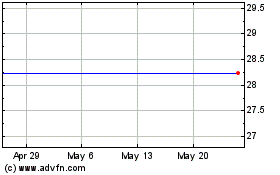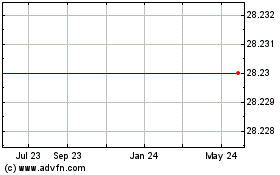Annovis Announces Publication That Supports Understanding of Buntanetap’s Mechanism of Action in Humans
April 01 2024 - 7:00AM

Annovis Bio, Inc. (NYSE: ANVS), a clinical-stage drug platform
company developing novel therapies for neurodegenerative diseases,
today announced the publication of new data from an earlier study
supporting buntanetap as a translational inhibitor of amyloid
precursor protein (APP) in patients with early Alzheimer’s Disease
(AD).
Buntanetap is an oral molecule that selectively binds to an
iron-responsive element in the mRNA of APP and other neurotoxic
proteins and inhibits their translation. Through this mechanism,
buntanetap was shown to decrease the production of amyloid beta
(Aβ), a key hallmark in AD. This study, which was finished in 2021,
aimed to assess pharmacodynamic effects of buntanetap on the
translation of APP mRNA by employing Stable Isotope Labeling
Kinetics (SILK). SILK measures the translation, steady state, and
degradation of a protein in the cerebrospinal fluid (CSF) and is
able to detect subtle protein changes, which cannot be measured in
normal CSF sampling. Here, SILK was used to measure the kinetics of
APP in early AD patients and to quantify Aβ40 in CSF.
In this randomized, double-blind, placebo-controlled study,
participants received oral buntanetap (1x60, 2x60 and 3x60 mg per
day or placebo) up to a 25-day period. At the end of the study,
patients were catharized in the lumbar spine for 36 hours to
accommodate the total time it takes for APP to be synthesized,
processed into Aβ, and degraded. A total of 15 patients completed
the study. Notably, the analysis of adverse events demonstrated no
dose-dependent effect of buntanetap compared to placebo, affirming
the drug’s safety and tolerability. Furthermore, multiparameter
modeling of APP kinetics provided additional evidence for
dose-dependent lowering of APP production by buntanetap. A model
that included the pre-drug lumbar CSF concentration as a covariate
showed statistical significance between the placebo and 120, 180 mg
per day buntanetap groups, suggesting a drug effect on lowering APP
production. In general, buntanetap lowered the rate of translation,
the maximum concentration (Cmax), lengthened the Tmax, and
decreased the area under the curve (AUC). It is important to note
that the results were not statistically significant (other than the
difference between placebo and 120 and 180 mg mentioned above) due
to a very small number of patients; however, the demonstrated trend
fully mirrors the mechanism of action of buntanetap as a
translational inhibitor of APP.
About Buntanetap Buntanetap
(formerly known as Posiphen or ANVS401) attacks neurodegeneration
by inhibiting the formation of multiple neurotoxic proteins -
amyloid beta, tau, alpha synuclein, and TDP43 - thereby improving
synaptic transmission, axonal transport and neuroinflammation.
Dysregulation of these pathways has been shown to be the cause of
nerve cell degeneration and ultimately death. By attacking these
pathways, buntanetap has the ability to reverse neurodegeneration
in Alzheimer’s Disease.
About Annovis Bio, Inc.Headquartered in
Malvern, Pennsylvania, Annovis Bio, Inc. is a clinical-stage, drug
platform company addressing neurodegeneration, such as Alzheimer’s
Disease (AD), Parkinson’s Disease (PD), and other chronic
neurodegenerative diseases. It is believed to be the only company
developing a drug for both AD and PD designed to inhibit more than
one neurotoxic protein to restore axonal and synaptic activity. By
improving brain function, the company’s goal is to treat memory
loss and dementia associated with AD as well as body and brain
dysfunction associated with PD. For more information on Annovis
Bio, please visit the Company's website www.annovisbio.com and
follow us on LinkedIn and Twitter.
Forward-Looking StatementsThis press release
contains "forward-looking" statements within the meaning of Section
27A of the Securities Act of 1933, as amended, and Section 21E of
the Securities Exchange Act of 1934, as amended. All statements
other than statements of historical fact are statements that could
be deemed forward-looking statements. The Company advises caution
in reliance on forward-looking statements. Forward-looking
statements include, without limitation, the Company's plans related
to clinical trials. These statements involve known and unknown
risks, uncertainties and other factors that may cause actual
results to differ materially from those implied by forward-looking
statements, including regarding patient enrollment, the
effectiveness of buntanetap and the timing, effectiveness, and
anticipated results of the Company's clinical trials evaluating the
efficacy, safety, and tolerability of buntanetap. See also
additional risk factors set forth in the Company's periodic filings
with the SEC, including, but not limited to, those risks and
uncertainties listed in the section entitled "Risk Factors," in the
Company's Annual Report on Form 10-K and Quarterly Reports on Form
10-Q filed with the SEC. All forward-looking statements in this
press release are based on information available to the Company as
of the date of this filing. The Company expressly disclaims any
obligation to update or alter its forward-looking statements,
whether as a result of new information, future events or otherwise,
except as required by applicable law.
Investor Contacts:Maria Maccecchini,
Ph.D.maccecchini@annovisbio.com
Annovis Bio (AMEX:ANVS)
Historical Stock Chart
From Dec 2024 to Jan 2025

Annovis Bio (AMEX:ANVS)
Historical Stock Chart
From Jan 2024 to Jan 2025
